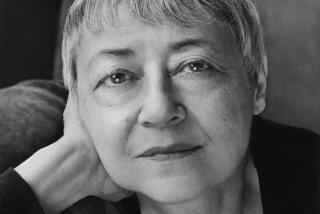Review: In Mona Awad’s ‘Bunny,’ squad goals include Pinkberry, creative writing and murder
“We call them Bunnies because that is what they call each other,” explains Samantha Heather Mackey, the narrator of Mona Awad’s new novel, “Bunny.” “Seriously. Bunny. … Bunny, I love you. I love you, Bunny.”
Awad does so many things right in “Bunny,” her follow-up to her 2016 debut novel, “13 Ways of Looking at a Fat Girl.” “Bunny” functions perfectly as both a dark academic satire and a creepy horror novel, and Awad threads them both seamlessly — she can make the reader laugh out loud in one paragraph, and cringe with fear in the next.
The young women are scarily believable contradictions — they’re ... literary riot grrrls with a cuddlecore aesthetic.
— Michael Schaub
Samantha, a student in a creative writing graduate program at a prestigious New England university, finds her simpering classmates intolerable, and with good reason. The coterie of four young women have made an art form out of platonic and public displays of affection: “How fiercely they gripped each other’s pink-and-white bodies, forming a hot little circle of rib-crushing love and understanding it took my breath away. … All four of their glossy mouths making squealing sounds of monstrous love that hurt my face.”
The Bunnies’ performative friendship rankles Samantha to no end, and she complains about them to her best friend, Ava, a semi-Goth cynic who also can’t abide the stubbornly twee clique, and to Jonah, a sweet young poet and recovering alcoholic who has taken a shine to Samantha.
Samantha senses that her dislike of the Bunnies is mutual, noting how her workshop classmates “would look down at each story I submitted like it was a baby that just gave them the finger, and then side-eye each other for a long time.”
So she’s shocked when the Bunnies invite her to a “Smut Salon,” a mysterious gathering to be held at one of their houses. Samantha’s morbid curiosity gets the best of her, and despite Ava’s wariness about the young women, she decides to show up.
The experience isn’t as bad as she feared and Samantha wonders whether she’s got her classmates all wrong. So she attends the next one. And that’s when things start to go wrong. Without giving too much away, there’s a fake prom that ends with someone’s head exploding, which tends to put a damper on even the most well-organized formal dance. Then things get even weirder.
The chapters that follow find Samantha in the thrall of the Bunnies, helping them conduct some truly alarming experiments involving (actual) bunnies, and eating lunch at a cutesy restaurant that only serves miniature foods. It doesn’t take long for things to get out of hand, and the novel culminates in a shocking and bizarre confrontation that you truly have to read to believe.
With the Bunnies, Awad has created some of the most memorable antagonists in recent fiction. The young women are scarily believable contradictions — they’re fans of both transgressive, experimental prose and Pinkberry frozen yogurt, literary riot grrrls with a cuddlecore aesthetic. They love-bomb Samantha one minute and tear her down the next, angering Ava, who hates their “little-girl cult.”
They’re also perfect foils for Awad’s satire of the preciousness and navel-gazing that sometimes accompany discourse about creative writing. The Bunnies try to get Samantha to collaborate with them on a project that they variously describe as “experimental,” “performance based” and “so intertextual,” eventually settling on “a hybrid.” (“That most obscure of academic beasts,” Samantha thinks. “What you call something when you just don’t know what you’re doing anymore.”) The scenes in which Samantha and her classmates discuss their respective projects will be darkly familiar to anyone who’s had to endure a creative writing workshop filled with gleefully pretentious would-be auteurs.
Awad is masterful at conjuring prose that’s both darkly atmospheric and creepily evocative.
— Michael Schaub
Awad has a true gift for satire — “Bunny” is as mercilessly funny as similarly themed novels by Jane Smiley (“Moo”) and James Hynes (“The Lecturer’s Tale”). But it also shines as a horror tale. The contrast between the Bunnies’ “My Little Pony”-inflected sensibilities and the horrifying nature of their, uh, “projects” proves chillingly effective; Awad is masterful at conjuring prose that’s both darkly atmospheric and creepily evocative. She also knows how to use pacing to build suspense — “Bunny” is just about as hard to put down as any book that’s come around in a while.
It’s a novel that’s difficult to describe but easy to fall in love with. Awad has created a singular world, inspired just as much by the dark fairy tales of the Brothers Grimm as it is by the cult-classic movie “Heathers” (which Awad makes several sneaky allusions to throughout the book). With her second book, Awad has proved herself one of the most innovative and original authors out there, and “Bunny” is a wild, audacious and ultimately unforgettable novel.
::
Mona Awad
Viking, 320 pp., $26
Schaub is a writer in Texas.
More to Read
Sign up for our Book Club newsletter
Get the latest news, events and more from the Los Angeles Times Book Club, and help us get L.A. reading and talking.
You may occasionally receive promotional content from the Los Angeles Times.






